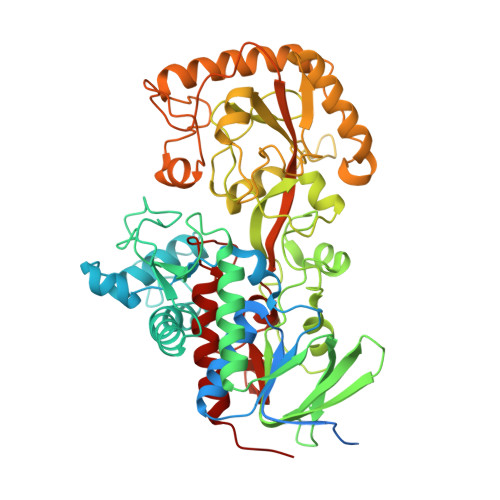Rational design of a cyclohexanone dehydrogenase for enhanced alpha , beta-desaturation and substrate specificity.
Singh, W., Brown, N.L., McCue, H.V., Marriott, S.R., Wilson, R.C., Perry, J., Turkenburg, J.P., Dubey, K.D., Prior, S.H., Carnell, A.J., Taylor, E.J., Black, G.W.(2024) Chem Sci 15: 4969-4980
- PubMed: 38550701
- DOI: https://doi.org/10.1039/d3sc04009g
- Primary Citation of Related Structures:
8AM3, 8AM6, 8AM8 - PubMed Abstract:
The selective α,β-desaturation of cyclic carbonyl compounds, which are found in the core of many steroid and bioactive molecules, using green chemistry is highly desirable. To achieve this task, we have for the first time described and solved the de novo structure of a member of the cyclohexanone dehydrogenase class of enzymes. The breadth of substrate specificity was investigated by assaying the cyclohexanone dehydrogenase, from Alicycliphilus denitrificans , against several cyclic ketones, lactones and lactams. To investigate substrate binding, a catalytic variant, Y195F, was generated and used to obtain a crystallographic complex with the natural substrate, cyclohexanone. This revealed substrate-active site interactions, as well as the proximity of the cofactor, flavin adenine dinucleotide, and enabled us to propose a mechanistic function to key amino acids. We then used molecular dynamic simulations to guide design to add functionality to the cyclohexanone dehydrogenase enzyme. The resulting W113A variant had overall improved enzyme activity and substrate scope, i.e. , accepting the bulkier carbonyl compound, dihydrocoumarin. Structural analysis of the W113A variant revealed a broader, more open active site, which helped explain the modified substrate specificity. This work paves the way for future bespoke regioselective α,β-desaturation in the synthesis of important bioactive molecules via rational enzyme engineering.
- Hub for Biotechnology in Build Environment, Department of Applied Sciences, Faculty of Health and Life Sciences, Northumbria University Newcastle upon Tyne NE1 8ST UK gary.black@northumbria.ac.uk.
Organizational Affiliation:



















